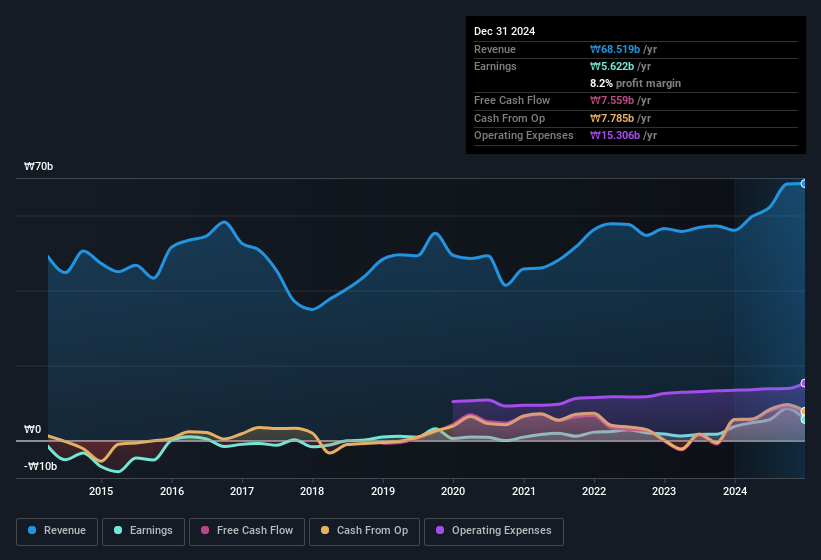Even though ELUON Corporation (KOSDAQ:065440 ) posted strong earnings, investors appeared to be underwhelmed. Our analysis says that investors should be optimistic, as the strong profit is built on solid foundations.

Zooming In On ELUON's Earnings
In high finance, the key ratio used to measure how well a company converts reported profits into free cash flow (FCF) is the accrual ratio (from cashflow). The accrual ratio subtracts the FCF from the profit for a given period, and divides the result by the average operating assets of the company over that time. The ratio shows us how much a company's profit exceeds its FCF.
As a result, a negative accrual ratio is a positive for the company, and a positive accrual ratio is a negative. That is not intended to imply we should worry about a positive accrual ratio, but it's worth noting where the accrual ratio is rather high. To quote a 2014 paper by Lewellen and Resutek, "firms with higher accruals tend to be less profitable in the future".
For the year to December 2024, ELUON had an accrual ratio of -0.20. That indicates that its free cash flow quite significantly exceeded its statutory profit. Indeed, in the last twelve months it reported free cash flow of ₩7.6b, well over the ₩5.62b it reported in profit. ELUON's free cash flow improved over the last year, which is generally good to see. Importantly, we note an unusual tax situation, which we discuss below, has impacted the accruals ratio.
Note: we always recommend investors check balance sheet strength. Click here to be taken to our balance sheet analysis of ELUON.
An Unusual Tax Situation
In addition to the notable accrual ratio, we can see that ELUON received a tax benefit of ₩1.3b. This is of course a bit out of the ordinary, given it is more common for companies to be paying tax than receiving tax benefits! The receipt of a tax benefit is obviously a good thing, on its own. However, the devil in the detail is that these kind of benefits only impact in the year they are booked, and are often one-off in nature. Assuming the tax benefit is not repeated every year, we could see its profitability drop noticeably, all else being equal. So while we think it's great to receive a tax benefit, it does tend to imply an increased risk that the statutory profit overstates the sustainable earnings power of the business.
Our Take On ELUON's Profit Performance
In conclusion, ELUON has strong cashflow relative to earnings, which indicates good quality earnings, but the tax benefit means its profit wasn't as sustainable as we'd like to see. Based on these factors, we think that ELUON's profits are a reasonably conservative guide to its underlying profitability. If you want to do dive deeper into ELUON, you'd also look into what risks it is currently facing. You'd be interested to know, that we found 1 warning sign for ELUON and you'll want to know about it.
In this article we've looked at a number of factors that can impair the utility of profit numbers, as a guide to a business. But there is always more to discover if you are capable of focussing your mind on minutiae. Some people consider a high return on equity to be a good sign of a quality business. While it might take a little research on your behalf, you may find this free collection of companies boasting high return on equity, or this list of stocks with significant insider holdings to be useful.
Valuation is complex, but we're here to simplify it.
Discover if ELUON might be undervalued or overvalued with our detailed analysis, featuring fair value estimates, potential risks, dividends, insider trades, and its financial condition.
Access Free AnalysisHave feedback on this article? Concerned about the content? Get in touch with us directly. Alternatively, email editorial-team (at) simplywallst.com.
This article by Simply Wall St is general in nature. We provide commentary based on historical data and analyst forecasts only using an unbiased methodology and our articles are not intended to be financial advice. It does not constitute a recommendation to buy or sell any stock, and does not take account of your objectives, or your financial situation. We aim to bring you long-term focused analysis driven by fundamental data. Note that our analysis may not factor in the latest price-sensitive company announcements or qualitative material. Simply Wall St has no position in any stocks mentioned.
About KOSDAQ:A065440
ELUON
Engages in the development and sales of software and network equipment in South Korea and Indonesia.
Adequate balance sheet with slight risk.
Market Insights
Community Narratives



